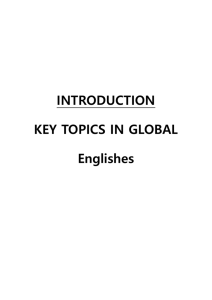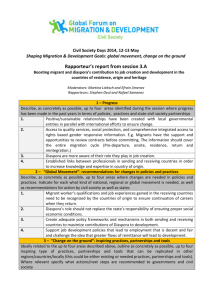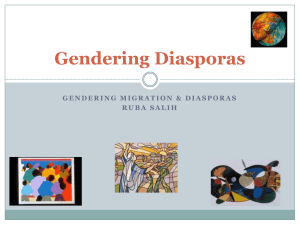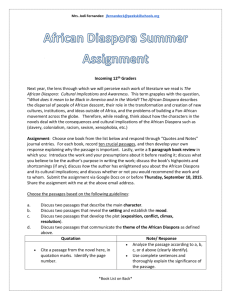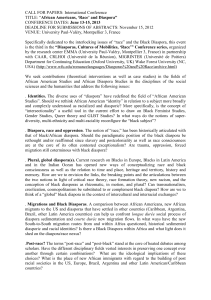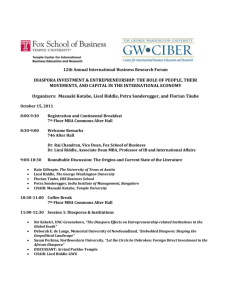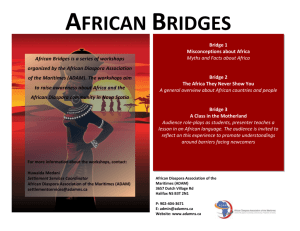Document 11102866
advertisement
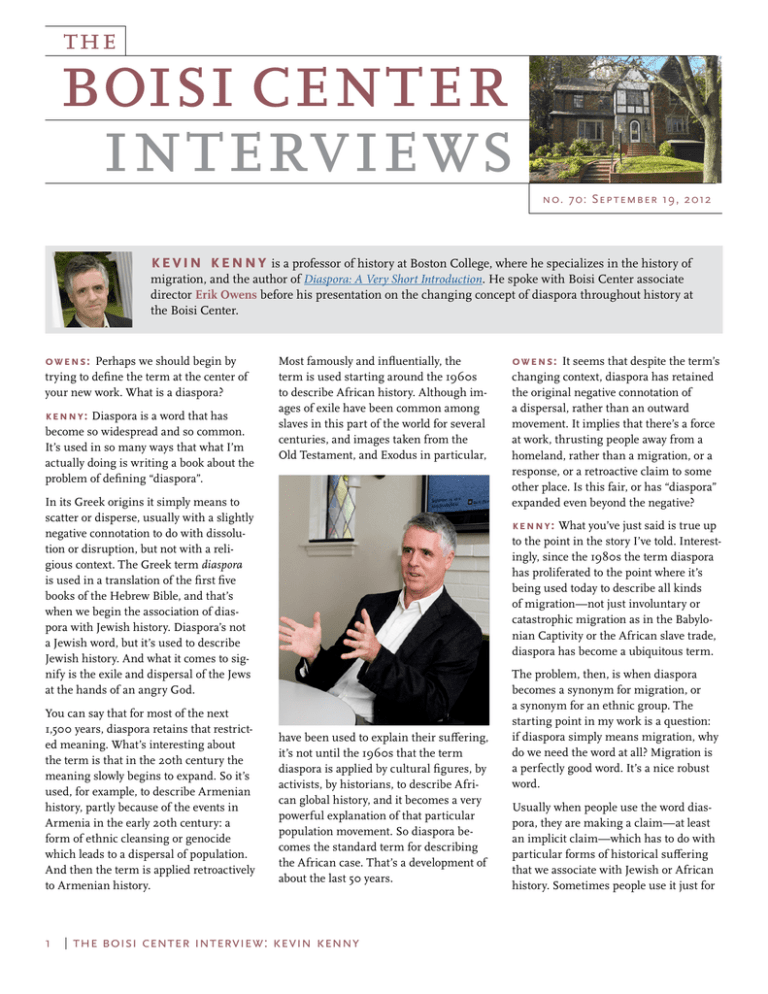
the boisi center interviews no. 70: Sep tember 19, 2012 kevin kenny is a professor of history at Boston College, where he specializes in the history of migration, and the author of Diaspora: A Very Short Introduction. He spoke with Boisi Center associate director Erik Owens before his presentation on the changing concept of diaspora throughout history at the Boisi Center. owens: Perhaps we should begin by trying to define the term at the center of your new work. What is a diaspora? kenny: Diaspora is a word that has become so widespread and so common. It’s used in so many ways that what I’m actually doing is writing a book about the problem of defining “diaspora”. Most famously and influentially, the term is used starting around the 1960s to describe African history. Although images of exile have been common among slaves in this part of the world for several centuries, and images taken from the Old Testament, and Exodus in particular, In its Greek origins it simply means to scatter or disperse, usually with a slightly negative connotation to do with dissolution or disruption, but not with a religious context. The Greek term diaspora is used in a translation of the first five books of the Hebrew Bible, and that’s when we begin the association of diaspora with Jewish history. Diaspora’s not a Jewish word, but it’s used to describe Jewish history. And what it comes to signify is the exile and dispersal of the Jews at the hands of an angry God. You can say that for most of the next 1,500 years, diaspora retains that restricted meaning. What’s interesting about the term is that in the 20th century the meaning slowly begins to expand. So it’s used, for example, to describe Armenian history, partly because of the events in Armenia in the early 20th century: a form of ethnic cleansing or genocide which leads to a dispersal of population. And then the term is applied retroactively to Armenian history. 1 owens: It seems that despite the term’s changing context, diaspora has retained the original negative connotation of a dispersal, rather than an outward movement. It implies that there’s a force at work, thrusting people away from a homeland, rather than a migration, or a response, or a retroactive claim to some other place. Is this fair, or has “diaspora” expanded even beyond the negative? kenny: What you’ve just said is true up to the point in the story I’ve told. Interestingly, since the 1980s the term diaspora has proliferated to the point where it’s being used today to describe all kinds of migration—not just involuntary or catastrophic migration as in the Babylonian Captivity or the African slave trade, diaspora has become a ubiquitous term. have been used to explain their suffering, it’s not until the 1960s that the term diaspora is applied by cultural figures, by activists, by historians, to describe African global history, and it becomes a very powerful explanation of that particular population movement. So diaspora becomes the standard term for describing the African case. That’s a development of about the last 50 years. the boisi center interview: kevin kenny The problem, then, is when diaspora becomes a synonym for migration, or a synonym for an ethnic group. The starting point in my work is a question: if diaspora simply means migration, why do we need the word at all? Migration is a perfectly good word. It’s a nice robust word. Usually when people use the word diaspora, they are making a claim—at least an implicit claim—which has to do with particular forms of historical suffering that we associate with Jewish or African history. Sometimes people use it just for stylistic variation, unthinkingly, without any particular meaning in mind, because it sort of sounds good. It has become a trendy word. owens: Jargon. kenny: It’s good jargon, it rolls off the tongue, has a nice sound to it. You can use that word to maybe give the impression that you’re lending weight and substance to particular claims. My book is all about that. If diaspora doesn’t mean migration, if they’re not synonymous, and we’re to retain the term at all, then what meaning can we attach to it? So what I do in my work, having clarified the origins, the proliferation, and the current confusion, is to take a look at how people are trying to define the term today. I think part of the confusion, actually, comes from the very attempt to define it, to pin it down under a single definition. I don’t think you can any longer pin the word down under a single definition. At the same time, if you leave the meaning open-ended, the term has no analytical value. In a situation like that, I think you have to step in, make certain stipulations, attach certain criteria. There’s a few different ways of doing that. The most common among sociologists and political scientists is to establish a typology for diaspora. You say, “diaspora exists if the following criteria are present: X form of migration, particular form of communication or connectivity, particular kind of relationship with the homeland”. The problem with that approach is it can become very rigid and static. It can also be arbitrary, because who is to say that my criteria are better than your criteria? You can end up with a checklist approach. So you’d say, “Here are the 10 things, and if you’ve got six of them, you’re in. If you’ve got five, maybe not”. The problem with that is some of the criteria actually are incommensurable, they’re looking at different things. Some are looking at migration, some are look- 2 ing at connectivity. There’s only so far you can go with that approach. The third approach looks at diaspora as a form of discourse. So the question there is not what diaspora is, but what it does. Instead of trying to identify diaspora as a discrete social entity, you actually think of it more in terms of a concept, an idea, something that people can use to make sense of their experience. “Is diaspora a categor y of analysis for scholars...or is it a categor y of prac tice that migrants can use in making sense of their own world? My answer is that it’s both.” That’s a promising approach, again up to a point. And the point is that—and this is an historian’s point that I’m making—if you don’t have evidence of people articulating a diasporic sensibility, you can’t just attribute it to them. So you need evidence in order to do that kind of work. If you want to treat diaspora as a category of discourse, then you need a body of discourse to examine. Most of the attempts­—the typological approach, the checklist approach, and the discourse approach—they have particular limitations. So I adjudicate them, and then I’ve got two choices: I can throw up my hands in despair and say, “Well, the boisi center interview: kevin kenny there’s not much we can do here.” Or I can step in and ask the question, “Is diaspora a useful category?” And if so, to whom? Is diaspora a category of analysis for scholars who are trying to make sense of migration, or is it a category of practice that migrants can use in making sense of their own world? My answer is that it’s both. I was going to say we scholars can use it and they, the migrants, can use it, but of course, as an immigrant I embody both. owens: You’re a we. kenny: Right, I’m a we. So I can use it as an academic intellectual. And I can also use it to make sense of my life experience. Governments can use it in various ways to reach out to their people abroad. So what I do then–this is a very long answer to your original question. owens: That’s all right. It’s my only question for the interview. kenny: Such is scholarship. This is all Chapter One of the book. But basically what I do is I say, if I’m going to treat diaspora that way—not treating it just as a category of discourse, for the reason I explained, and not proposing a rigid typology, for the reason I explained—what I need is a set of flexible criteria which suggest that diaspora might be a useful explanatory category. What I end up finding is that diaspora can be useful in explaining what we might call voluntary migration that works along the lines of networks, because diaspora has to do with networks, connections, webs. But what I actually find that it’s invariably more useful in distinguishing voluntary from involuntary migration, and that it’s at its most useful in dealing with forms of migration that are catastrophic or involuntary in nature, which takes us back to the Jewish and African case, to the Armenian case, to the Irish famine. In the case of Irish migration, I think “migration” is a perfectly fine term. But there are certain particular points within that history of migration where “diaspora” is useful. The key point is the Irish famine, because it is catastrophic in origin, it involves the reduction of the population by one-third through death and migration, and it involves migration to multiple destinations. So the first point has to do with the nature of migration. The second has to do with the kinds of activities migrants engage in abroad, the connections that they form. I find that diaspora is most useful when those connections become multi-polar rather than uni-linear. In standard migration history we deal very frequently with the relationship between country A and country B. People came from country A and settle in country B; you get a uni-linear connection between them. But where diaspora becomes interesting is when it opens up the possibility of communication between globally scattered communities of common origin who are living around the world and communicating with one another, and not just with their homeland. So in that model, which is more of a web or a network, the homeland becomes decentered. It’s just one location in a larger worldwide web. That word homeland is critical. The idea of some sort of connection with the homeland, imagined or real—not every group had a homeland to begin with, many diaspora groups seek to create one—the idea of return, sometimes literal, as in Israel. More often metaphorical, as in many of the African cases. And then the final part of the framework is that there are two corollaries from what I said; one, that diaspora seems to work best when migration is to multiple destinations at once, because that facilitates the network; and two, that it needs to endure over time for a diasporic sensibility to emerge. I finish the book with an account of contemporary developments, which for 3 me as an historian means the second half of the 20th century. But I look at a series of developments since World War II that I think explain why diaspora has become so prevalent today. They have to do with decolonization, the recognition of refugees—international recognition of refugees—the phenomenon called double or repeat migration, where Asian groups in particular who had migrated earlier are forced out or by the independence of countries in Africa or Asia. And very interestingly, the efforts of governments to reach out and claim their diasporas. You see that all over by Armenia, Ireland, China, India. African Union has named the African diaspora the sixth region of the African Union. What states are looking for is political support and money, investment. What the people are getting in return is flexible citizenship. That’s a classic example, I think, of where diaspora is useful, right? It’s a useful category of practice, and not just of analysis. owens: But that last point seems to highlight the loss of this claim to moral or physical suffering that is at the root of a diasporic claim. Once it becomes a matter of economic citizenship norms, as opposed to a history of suffering, then it’s off the rails, in a way, from the sense that you seem to be circumscribing. Is the boisi center interview: kevin kenny that one of the issues at stake in claiming one’s group to be a diaspora in the contemporary discourse, or has it flattened so much that now the language is less crucial? I hear you trying to reform our understanding of what’s truly diasporic and what’s not, but that last example seems to push off of your chart. kenny: It does, and it takes me back to where the book begins, which is that diaspora is this ubiquitous concept, to the point that it’s been drained of meaning. So I devote a book to attaching meaning to it, which I think is a useful exercise for scholars, for students, for general readers. But I end the book by saying that—and the book is called Diaspora: A Very Short Introduction—so I end the book by saying that if a given group chooses to define itself as diasporic, who is the author of a very short introduction to disagree, right? I’m not expecting the book to change the world, but I think it might help us, and it might help students. owens: I have one last question. Dan Kanstroom has written a book recently claiming that deported immigrants form an American diaspora. It seems to me he has a claim to make among the moral suffering sort of category, although the rootedness of the people who are being expelled is a matter of question. Have you been in conversations with him about this? kenny: Yeah, I have. The rootedness is in question. Take, for example, sometimes it is and not in a 41-year-old man who came here at the age of three. His parents were illegal, or undocumented, and he eventually had to leave. There’s certainly a subset among the deportees who I could only describe as Americans abroad. In some cases, the connectedness to America is clear. Dan is dealing with real-world issues. What if those people abroad began to communicate with each other on the basis of common experience, having lived here and been deported? Then you’d be into the realm of multi-polar connectivity, where I see diaspora as being useful. I think Dan’s use of the term, which is as a forcibly expelled community living in another country, is a pretty good starting point. owens: And it makes a moral claim as well. kenny: It makes a moral claim, yeah. Now the problem is that using diaspora carries a moral baggage, and it allows you to tap into particular forms of historical suffering. That can be quite useful, especially if you can locate your claim to suffering safely in the past, and you’re doing pretty well in the present. [end] The Boisi Center for Religion and American Public Life Boston College 2 4 Quinc y Road Chestnut Hill, MA 02 467 tel 617 - 55 2-1860 f a x 617 - 55 2-1863 publife@b c .e du Visit bc .e du/boisi-resources for a complete set of the Boisi Center Inter views and audio, video, photographs, and transcripts from our events. 4 the boisi center interview: kevin kenny b oisicenter @b oisi _ center
